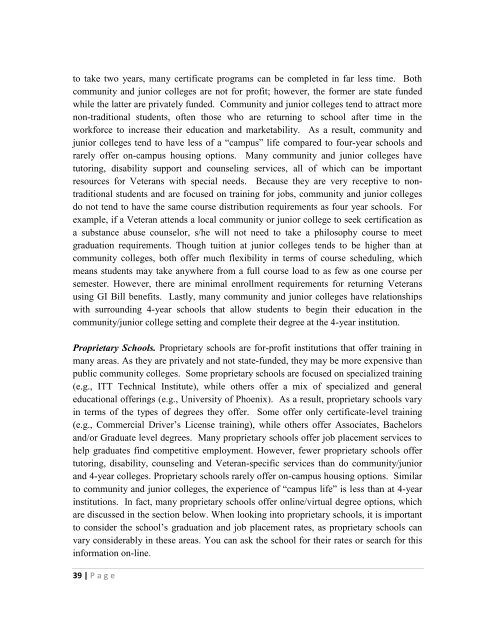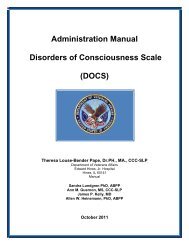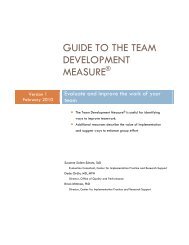The Veteran Supported Education Service Treatment Manual: VetSEd
The Veteran Supported Education Service Treatment Manual: VetSEd
The Veteran Supported Education Service Treatment Manual: VetSEd
You also want an ePaper? Increase the reach of your titles
YUMPU automatically turns print PDFs into web optimized ePapers that Google loves.
to take two years, many certificate programs can be completed in far less time. Both<br />
community and junior colleges are not for profit; however, the former are state funded<br />
while the latter are privately funded. Community and junior colleges tend to attract more<br />
non-traditional students, often those who are returning to school after time in the<br />
workforce to increase their education and marketability. As a result, community and<br />
junior colleges tend to have less of a ―campus‖ life compared to four-year schools and<br />
rarely offer on-campus housing options. Many community and junior colleges have<br />
tutoring, disability support and counseling services, all of which can be important<br />
resources for <strong>Veteran</strong>s with special needs. Because they are very receptive to nontraditional<br />
students and are focused on training for jobs, community and junior colleges<br />
do not tend to have the same course distribution requirements as four year schools. For<br />
example, if a <strong>Veteran</strong> attends a local community or junior college to seek certification as<br />
a substance abuse counselor, s/he will not need to take a philosophy course to meet<br />
graduation requirements. Though tuition at junior colleges tends to be higher than at<br />
community colleges, both offer much flexibility in terms of course scheduling, which<br />
means students may take anywhere from a full course load to as few as one course per<br />
semester. However, there are minimal enrollment requirements for returning <strong>Veteran</strong>s<br />
using GI Bill benefits. Lastly, many community and junior colleges have relationships<br />
with surrounding 4-year schools that allow students to begin their education in the<br />
community/junior college setting and complete their degree at the 4-year institution.<br />
Proprietary Schools. Proprietary schools are for-profit institutions that offer training in<br />
many areas. As they are privately and not state-funded, they may be more expensive than<br />
public community colleges. Some proprietary schools are focused on specialized training<br />
(e.g., ITT Technical Institute), while others offer a mix of specialized and general<br />
educational offerings (e.g., University of Phoenix). As a result, proprietary schools vary<br />
in terms of the types of degrees they offer. Some offer only certificate-level training<br />
(e.g., Commercial Driver‘s License training), while others offer Associates, Bachelors<br />
and/or Graduate level degrees. Many proprietary schools offer job placement services to<br />
help graduates find competitive employment. However, fewer proprietary schools offer<br />
tutoring, disability, counseling and <strong>Veteran</strong>-specific services than do community/junior<br />
and 4-year colleges. Proprietary schools rarely offer on-campus housing options. Similar<br />
to community and junior colleges, the experience of ―campus life‖ is less than at 4-year<br />
institutions. In fact, many proprietary schools offer online/virtual degree options, which<br />
are discussed in the section below. When looking into proprietary schools, it is important<br />
to consider the school‘s graduation and job placement rates, as proprietary schools can<br />
vary considerably in these areas. You can ask the school for their rates or search for this<br />
information on-line.<br />
39 | P a g e
















